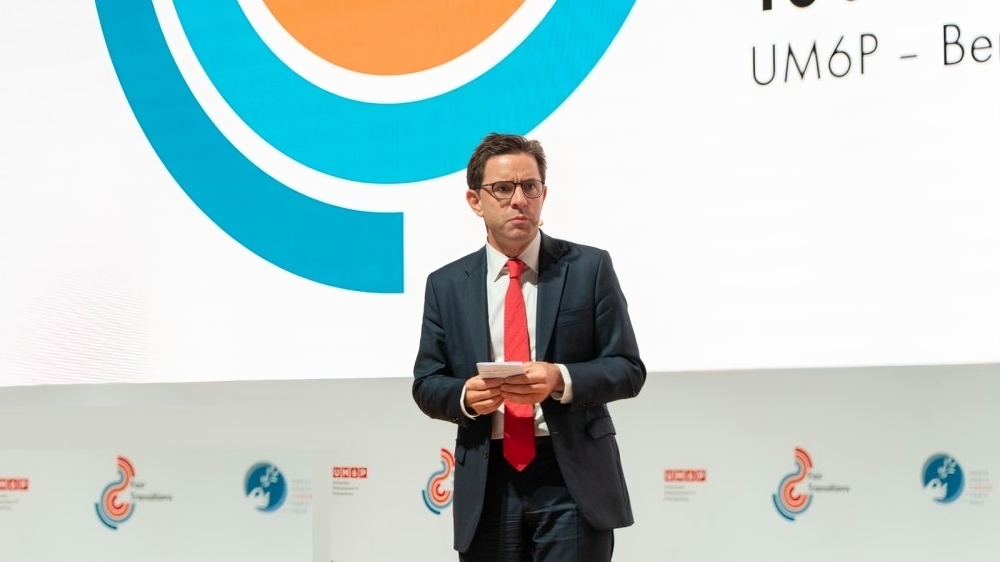- 13:40كلميم.. الدرك يفشل مخططا لتهجير 217 شخصا عبر “قوارب الموت”
- 13:22فوز ترامب.. تفاؤل إسرائيلي بعودة الدفء للعلاقات مع المغرب
- 13:19مجلة إسبانية: 49 عاماً من التقدم والتنمية في الصحراء المغربية
- 13:12تأخير ملف بودريقة والموثق
- 13:03الإقصاء من الدعم يشعل احتجاجات متضرري زلزال الحوز
- 12:43الأمن يجهض عملية تهريب 5 أطنان من الحشيش بآسفي
- 12:13رئيس شبكة الكفاءات الطبية لمغاربة العالم يُشيد بمبادرة جلالة الملك
- 11:59عرشان ل"ولو": حزبنا غير مستهدف ولانعرف مكان اعتقال تالموست
- 11:55أزمة المياه.. توقعات باستمرار إنتاج الأفوكادو خلال الموسم الجديد
تابعونا على فيسبوك
Paris Peace Forum Navigates Path for Equitable Global Transitions
The Paris Peace Forum (PPF) concluded its groundbreaking Spring Meeting in Benguerir, Morocco, at the University Mohammed VI Polytechnic (UM6P), marking a historic first as the global governance platform convened outside Europe. This strategic shift in location underscored a central theme of the event: "Fair Transitions," highlighting the urgent need for equitable solutions to interconnected global challenges spanning climate change, global health, and geopolitical conflicts.

In his closing remarks, Justin Vaïsse, Managing Director of the Paris Peace Forum, emphasized the significance of the African venue, stating, "Today, we had a rich North-South discussion on just transitions. For many African countries, the economic model doesn't need to change due to high CO2 emissions. But if we're talking about a global transition, the North-South disparity must be addressed." Vaïsse underscored the delicate balance required between climate protection and developmental progress, noting, "We can't wait for the entire world to be developed to fight climate change, nor can we fight climate change at the expense of developmental progress." He expressed concerns about dwindling resources for these goals, exacerbated by the COVID-19 pandemic, and highlighted structural challenges like the high cost of capital in Africa, which hinders sustainable development projects.
The discussions also touched on the political climate in Europe, with worries about the rise of the extreme right and its potential impact on international cooperation. Vaïsse stressed the importance of multi-actor collaboration and political engineering to overcome these challenges.
Moving Beyond Dialogue: Tangible Progress
The forum wasn't merely a platform for identifying problems; significant progress was achieved in three key areas: agriculture, nutrition, and critical minerals, laying the groundwork for tangible solutions.
First, the creation of the Atlas Laboratory, supported by 22 organizations, aims to align Northern and Southern visions on African agricultural development. This initiative seeks to feed not only Africa but also contribute to global food security.
Second, the Nutrition for Growth summit, scheduled for March 2024, will address global nutrition issues. The forum launched a group of experts and a private sector contact group to develop effective policies and solutions.
Third, the World Council for Responsible Transition Minerals was launched to tackle the geopolitical and environmental challenges associated with critical minerals. According to Vaïsse, this council aims to create a more responsible global market, avoiding the pitfalls of past energy geopolitics.

Nadia Fettah Alaoui, Morocco's Minister of Economy and Finance, highlighted Morocco's initiatives in ecological transition and sustainable development under King Mohammed VI's vision during the closing ceremony. She detailed Morocco's national sustainable development strategy, energy projects like the Noor solar complex, and efforts to address water scarcity with a $14 billion plan.
Nadia Fettah emphasized the need for inclusive development, citing Morocco's expansion of mandatory health insurance and direct support for housing. "The dual challenge of financing climate transition and development is a daily struggle," she said, noting that many African countries face significant financial hurdles. She called for more concessional funding and blended finance to support these transitions.
Highlighting the stark disparity, Nadia Fettah pointed out, "Africa captures less than 5.5% of climate transition funding despite accounting for less than 9% of carbon emissions." The high cost of capital in Africa, exacerbated by global financial policies, poses a severe challenge to sustainable development.
Nadia Fettah also stressed the importance of giving developing countries a stronger voice in global decisions, citing Africa's recent inclusion in the G20 as a positive step but insufficient for meaningful change. She urged for quicker and more coherent implementation of financial reforms to support "just transitions."
In her closing remarks, Nadia Fettah expressed optimism about the collective will to build bridges between nations and sectors. She thanked the UM6P and the OCP Group for hosting the forum in a symbolic place of academic excellence and innovation, stating, "Together, we can create a better, fairer, and more sustainable future."
The Paris Peace Forum serves as an annual platform for fostering international cooperation on issues related to global governance and multilateralism. Its core mission is "to develop coordination, rules, and skills to address global problems" through a multi-pronged approach, facilitating dialogue between world leaders, international organizations, and civil society actors throughout the year, culminating in an annual event in November.
This landmark event outside the French capital city underscored the critical role of inclusive global governance and the importance of addressing disparities to achieve fair transitions for all, paving the way for continued collaboration and action on the world's most pressing challenges.



